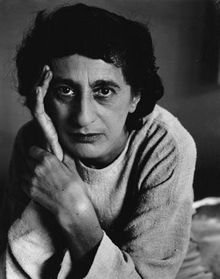Anni Albers
Anni Albers (1899-1994) was an influential weaver, textile designer, and printmaker whose sixty-year career advanced weaving as a modernist medium and inspired a reconsideration of textiles as an art form. A retrospective of her work at the Museum of Modern Art in New York in 1949 was the museum’s first solo exhibition dedicated to a textile artist. She is the author of the seminal texts On Designing (1959) and On Weaving (1965).
Born Annelise Fleischmann to an affluent family in Berlin, Albers first studied drawing and painting before attending the Bauhaus, a pioneering and influential German art and design school. To her chagrin, she was enrolled in the only workshop open to female students: weaving. She eventually embraced the medium, creating bold, richly colored, abstract works and experimenting with traditional and synthetic threads, yarns, and fibers. After graduating in 1930, she became the head of the weaving workshop. While at the Bauhaus, she met and married fellow artist Josef Albers (1888-1976).
When the Bauhaus closed under pressure from the Nazi regime, Albers and her husband fled to America in 1933. Albers taught at Black Mountain College, an experimental interdisciplinary school in North Carolina that became an incubator for modernist artistic talent, until 1949. During this time, the Alberses frequently traveled to Mexico, a country that greatly captured their interest and influenced their artwork. In 1950, Josef accepted a position at Yale University, and Albers moved to New Haven, Connecticut.
In 1963, Albers began to focus on lithography and screen printing. Her printmaking practice explored the interplay between dynamic patterns and bold color and textile-related concerns such as pattern, line, knotting, and texture. She continued printmaking and textile design until her death in 1994.




